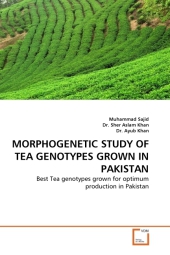 Neuerscheinungen 2010Stand: 2020-01-07 |
Schnellsuche
ISBN/Stichwort/Autor
|
Herderstraße 10
10625 Berlin
Tel.: 030 315 714 16
Fax 030 315 714 14
info@buchspektrum.de |

Ayub Khan, Sher Aslam Khan, Muhammad Sajid
(Beteiligte)
MORPHOGENETIC STUDY OF TEA GENOTYPES GROWN IN PAKISTAN
Best Tea genotypes grown for optimum production in Pakistan
2010. 60 S.
Verlag/Jahr: VDM VERLAG DR. MÜLLER 2010
ISBN: 3-639-25074-5 (3639250745)
Neue ISBN: 978-3-639-25074-9 (9783639250749)
Preis und Lieferzeit: Bitte klicken
Six genotypes of Tea Camellia sinensis L. i.e.,Indonesian, Sri Lankan, Ruopi, Qi men, Chuye & Japanese were tested at NTRI during 2008, for 8 qualitative & 12 quantitative characters. Germplasm was classified into three clusters based on qualitative traits analysis using wards method.This indicates the trait homology between Indonesian & Qi Men for Leaf shape, leaf margin, leaf lower surface, leaf upper surface, shoot color,& posture of leaf base. The linkage distance of their homology is 1.4 LD. The highest value for Veins pairs per leaf showed by Indonesian (13.60), followed by Qi men (12.08).Lowest value of Internodes distances showed by Ruopi (3.6cm), followed by Qi men (3.7 cm).Min Value of branch angle to stem showed by Qimen 35° followed by Japanese i.e. 38°. Qi men & Sri Lankan showed the mean number of Leaves at shoot (2.4).It is concluded that genotype Qi men remain ideal for desired quantitative traits, e. g vein pair & numbers of leaves at shoot, internodes distances & ideal branch angle. This morphogenetic distinctiveness recommends that Qi men is well suited in the climatic condition of Pakistan for the production of tea.


